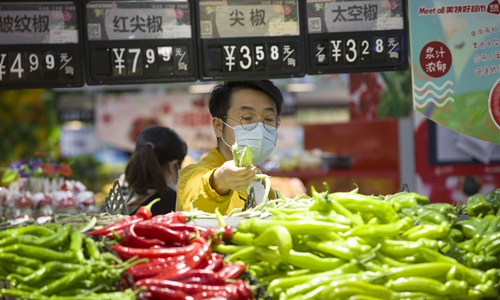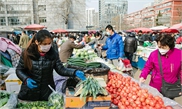SOURCE / MARKETS
CPI up 3.3% in April as COVID-19 impact ebbs: experts

A consumer buys vegetables at a supermarket in Taiyuan, North China's Shanxi Province on Tuesday. China's consumer price index (CPI), a main gauge of inflation, rose 3.3 percent year-on-year in April, down 1.0 percentage points from March, the NBS said on Tuesday. Photo: cnsphoto
China's consumer price index (CPI), a main gauge of inflation, and its producer price index (PPI), which measures the cost of goods at the factory gate, continued to decelerate in April.
The declines hint at the risk of structural deflation, and they also mean that the nation has more scope to roll out stimulus measures to offset the economic impact of the coronavirus, experts said.
The wind-down of CPI in April reflected falling food prices as China economy has gradually reopened following the country's successful prevention and control of Covid-19, according to Dong Lijuan, a senior statistician at the National Bureau of Statistics (NBS).
Food price increases eased due to sufficient supplies of fresh vegetables and increasing hog production and supplies, according to Dong.
The CPI rose 3.3 percent year-on-year in April, down 1.0 percentage points from the March reading, the NBS said on Tuesday. The PPI slid 3.1 percent year-on-year in April, compared with a 1.5-percent fall in March.
Lower food prices, resulting from increasing supplies on the market, and declining bulk commodity prices like oil and iron ore, contributed to the price deceleration, Liu Xuezhi, a macroeconomics expert at the Bank of Communications, told the Global Times on Tuesday.
According to the NBS, food prices rose 14.8 percent year-on-year in April, down 3.5 percentage points from the previous month. The pork price rose 96.9 percent year-on-year in the month, down 19.5 percentage points from March.
Non-food prices rose 0.4 percent year-on-year in April, down 0.3 percentage points from March. Affected by fluctuating international crude oil prices, the cost of gasoline, diesel and liquefied petroleum gas decreased 7.5 percent, 8.2 percent and 3.7 percent, respectively.
"The impact of the coronavirus on consumer prices is weakening and there will not be significant price hikes in the future," Liu said. He predicted consumer prices will continue to ease through the year.
"The CPI is likely to remain below 3 percent in the coming months due to weak demand," Liu said.
The drop in PPI numbers was mainly caused by the slump in global oil prices and the adverse impact of COVID-19 on domestic demand for industrial products, according to a report sent by Nomura Holdings to the Global Times on Monday.
Producer prices in the oil and natural gas extraction sector dropped 51.4 percent year-on-year, down 29.7 percentage points from March and prices in the refining industry fell 19.8 percent year-on-year, down 9.2 percentage points.
"This trend can lead to huge economic pressure on industrial enterprises, which poses a certain risk of structural deflation at the wholesale level," Liu said.
He suggested that China decision-makers continue to support domestic demand and maintain market liquidity, as the country still faces downward economic pressure.
"If proactive policies such as tax and fee reductions are in place, PPI inflation is expected to stabilize in the third quarter," Liu said.

